Lifestyle, training, and diet are the three overarching umbrellas that affect our health and fitness goals, and figuring out how to best balance them is unique from person to person. For instance, someone trying to lose body fat trains differently, eats differently, and goes about their day differently than a powerlifter on a strength cycle.
But central in almost any fitness plan is nutrition. Although needs shift from person to person, eating nutrient-dense foods full of essential minerals, fats, and amino acids (protein) is at the root of any diet.
MCT Oil: The saturated fat for training both your body and your mind!
When we say "nutrient-dense" and "essential", there is a great amount of misunderstanding. Our take is that a highly-misunderstood "essential" fat is saturated fat, and a group of these increasingly popular fats are in the group of medium chain triglycerides, which boast powerful health benefits. Otherwise known as MCT (or MCT Oil), these critically useful fatty acids are finally getting recognition like other important fatty acids. As a high-quality source of dietary fat, MCTs have a ton to offer, with evidence supporting it can yield positive effects in your training, your body, and your mind!
TL;DR (Article Summary)
MCT Oil, short for medium chain triglycerides, are a group of saturated fatty acids that are quickly-absorbed for rapid energy thanks to their shorter structure.
-
Saturated fat is healthy. There is no causal link whatsoever between saturated fat and heart disease or obesity. In fact, the obesity crisis began when we collectively replaced saturated fat with omega-6 polyunsaturated fats from "vegetable oils". (See the saturated fat discussion)
-
The medium chain triglycerides, or "MCTs", are a group of saturated fatty acids with "medium" chain lengths, ranging from six to twelve carbon bonds. These fatty acids caproic acid (C6), Caprylic acid (C8), Capric acid (C10), and Lauric acid (C12). (See the MCT Intro section)
When supplemented, MCTs demonstrated the following benefits: Decreased appetite (through increased satiety), increased cognition, improved beta-oxidation (fat burning) rates, better gut health, and potential immune system improvements. (See the MCT oil benefits section)
-
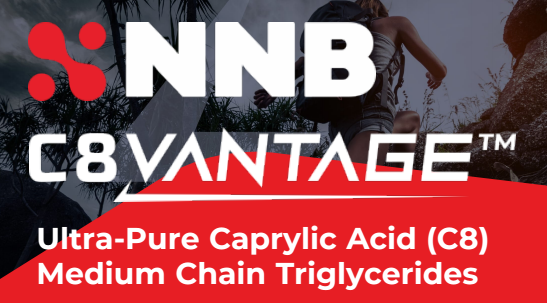
When looking for quality MCT Powder, C8 (Caprylic Acid) is the way to go, and C8Vantage from NNB Nutrition is where to get it. Read more here and on NNBNutrition.com
Due to unfavorable characteristics of C6 and C12, C8 and C10 are the preferred MCTs to supplement, with C8 having the best data in terms of beta oxidation and ketone generation. (See the MCT Supplements section)
-
Preferred MCT Oil Products:
-
For powdered MCT Oil, we prefer C8Vantage, which is made by NNB Nutrition and is a nearly-pure C8 formula that is GMO-Free, vegan-friendly, and has no glycemic impact since it is plated on tapioca prebiotic fiber and pea protein, bt other dairy-based options are available as well.
-
In this post, we're going to take a deep dive into MCTs - what they are, why they're different, how to use them, and where you can find the best ones - both in liquid and powder form. We're also going to look at published research focused on MCTs, which will help us paint a clearer picture of their benefits. Brace yourself for an in-depth, science-backed look at a food seemingly built for athletic and cognitive performance!
Before going further, feel free to subscribe to our notifications to get alerted on deals, videos, and blog posts on any of the topics on this page, as there are always ongoing updates and newer research:
Subscribe to PricePlow's Newsletter and Alerts on These Topics
MCTs - the optimal fat source for efficient energy?
Before we can get into medium-chain triglycerides (MCTs) and all they have to offer, it's imperative that we begin by discussing dietary fats in general, and what separates the MCTs from the rest.

Saturated Fat is back on the menu, folks! And if you still don't want red meat, MCTs are a great source of healthy saturated fats. Read the research and see how saturated fat is not associated with heart disease.
Not so long ago, dietary fats were portrayed as a common enemy by Western governments and their sponsors. The distorted theory that "dietary fat leads to body fat" only paints half of the picture, and we've begun to understand the importance of quality dietary fat within the sphere of living a healthy lifestyle. In appropriate amounts, fats are imperative for overall health, especially in regards to keeping your heart in check.
That being said, not all fats are created equal - there are multiple "groups" of fats, some of which are superior to others - and others that are downright toxic and obesogenic.
For instance, it's well-agreed that monounsaturated fats from meat, nuts, and fruits like olives and avocados are quite beneficial,[1] and omega-3 polyunsaturated fatty acids from fish are incredibly healthy.[2] However, not all polyunsaturated fats are the same -- omega-6 polyunsaturated fats from "vegetable oils" are highly obesogenic and inflammatory.[3]
But what about saturated fats?
What to make of saturated fats
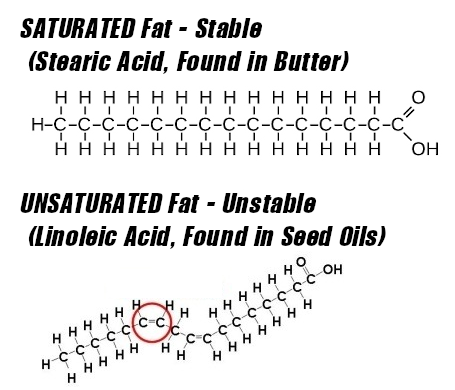
The "saturation" of Saturated Fats' carbon atoms makes it more stable and less prone to oxidation or rancidity. The less we eat of them, and the more omega-6 polyunsaturated fats like linoleic acid we eat... the sicker we get.
The picture seems to be a bit cloudier when discussing another important group of fats, saturated fats. This family of dietary fats are different in a couple of ways, especially in their construction: saturated fats have no double bonds between any carbon atoms, whereas unsaturated fatty acids do. In other words, each carbon atom is completely saturated with hydrogen atoms,[4] yielding a far more stable bond structure, and less likely to go rancid like polyunsaturated fats.
Saturated fats are commonly found in animal products, heavy dairy products, and coconut oil, one of the top MCT sources available. But as we'll see below, coconut oil itself isn't the best way to get MCTs in.
First, let's dive deeper into the controversy of saturated fat:
The research on saturated fat conflicts with modern recommendations from "authorities"
While there seems to be a consensus in the stances on unsaturated fats, there is a high level of dissonance regarding saturated fats. There seems to be an unwarranted stigma towards them, even though science doesn't support the notion that saturated fats are hazardous:
-
Research suggests that saturated fats actually improve cholesterol levels and composition by enlarging the size of low-density lipoprotein (LDL) cholesterol molecules.[5] This is important, considering that larger LDL molecules may reduce the risk of heart disease![6]
-
A 2015 meta-analysis of 76 studies found no relationship between saturated fat and heart disease.[7]
-
A 2019 re-analysis of the research used by the "American Heart Association" suggesting limits on saturated fat intake actually determined that their trials contained methodological flaws and didn't even meet acceptable modern standards for inclusion.[8]
The "4 Core Trials" used by the American Heart Association to push saturated fat elimination are woefully poorly done and out of date.[8]
It included a meta analysis of 19 studies (10 of which were randomized controlled trials) showing a lack of association between saturated fatty acid intake and heart disease.[8]
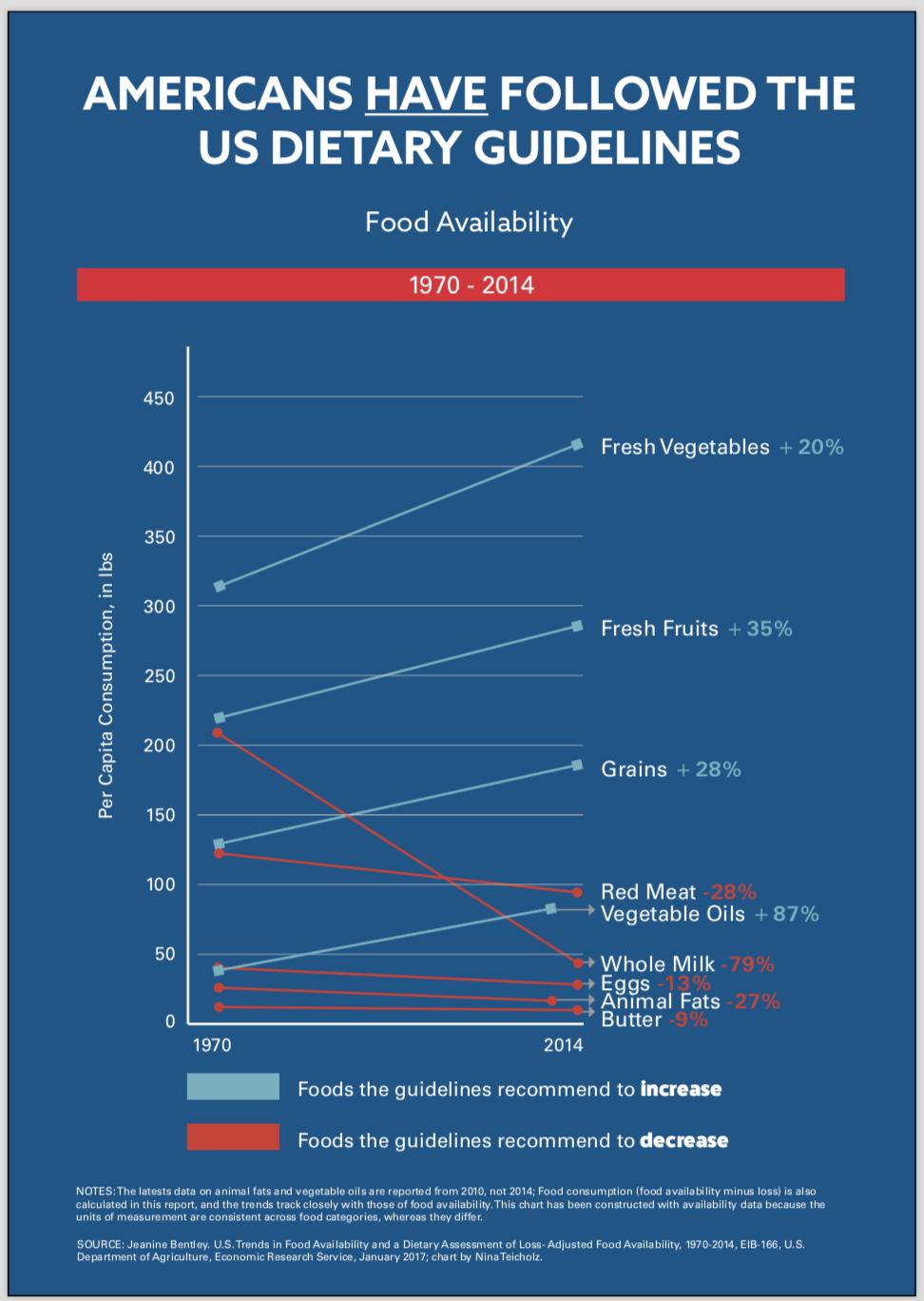
Americans did listen to the food guidelines.. and we got sicker and fatter than ever. Are we sure red meat, saturated fat, and cholesterol are really the issue?!
If saturated fat is unhealthy, then why did we get sicker when we stopped eating them?
As you can see, the bad rap that saturated fats get are quite overstated. There was no obesity epidemic when we were eating plenty of red meat and butter. In fact, the epidemic started when we stopped eating saturated fats, and switched to the toxic omega-6 polyunsaturated fats from vegetable oils.
The data supports that saturated fat intake is something that's fine in amounts that don't cause you to gain weight. As a dieting adult, you shouldn't eat anything to the point of fat gain, and you certainly shouldn't be completely excluding it either!
Now that we've briefly touched on the different types of fats and the research around them, we can start discussing MCT oil, a type of saturated fat that has significant benefits when consumed responsibly!
Medium-chain triglycerides - faster metabolization, faster availability
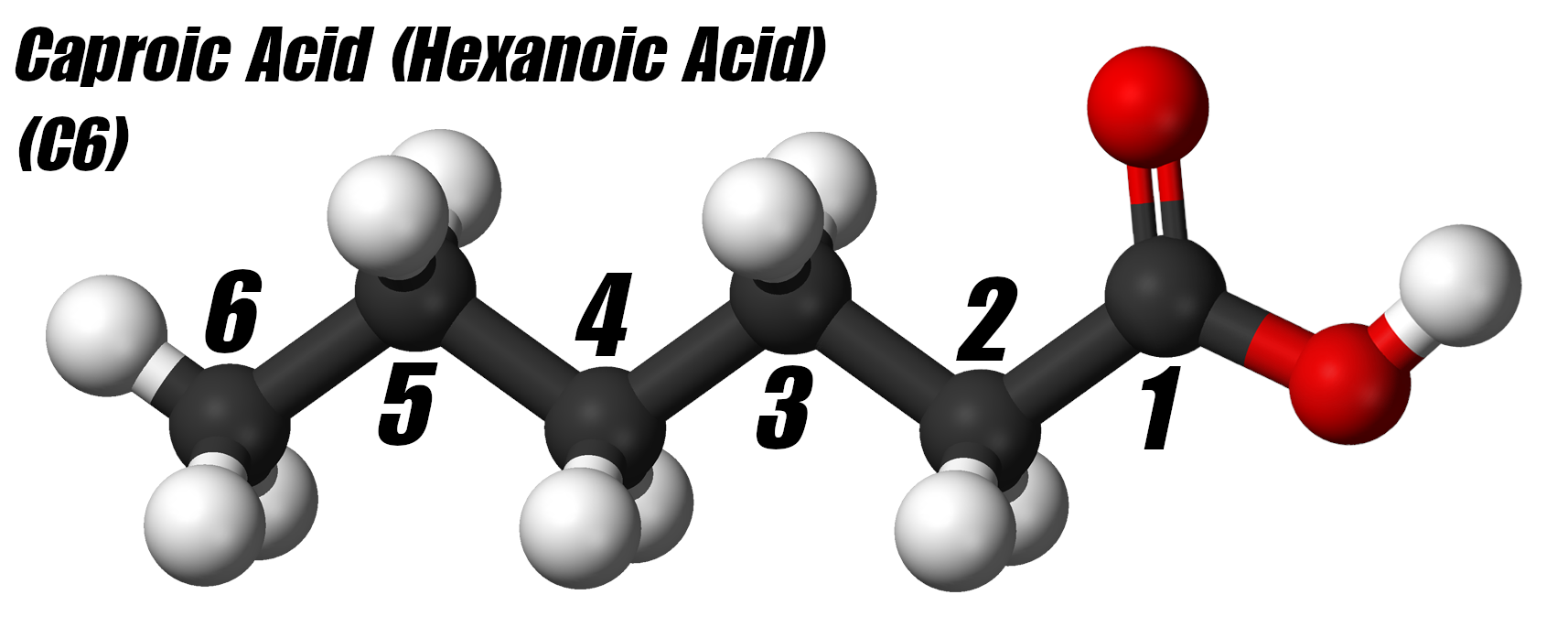
Also known as Caproic Acid, Hexanoic Acid (C6) is a potent MCT, but yields a burning sensation in the throat, which is why it's not used in supplements.
Earlier, we mentioned the carbon construction of fatty acids, and this becomes pertinent with MCTs. The name "medium-chain triglycerides" is actually derived directly from that molecular build - MCTs are fatty acids with somewhere between six to twelve carbon atoms.[9] There are four different MCTs, some combination of the which ultimately comprise MCT oil:
- Caproic acid (C6) - six carbon bonds*
-
Caprylic acid (C8) - eight carbon bonds
- Capric acid (C10) - ten carbon bonds
- Lauric acid (C12) - twelve carbon bonds**
*Caproic acid (C6), also known as Hexanoic acid, is normally filtered out because it causes a burning sensation in the throat and great gastrointestinal distress, although it is very ketogenic.[10]

Capric Acid (C10) is also known as decanoic acid and is an effective MCT to supplement, although not as effective as C8 in some research.
**Lauric acid (C12) is hotly debated, as it behaves more like a long-chain fatty acid and doesn't provide the near-immediate energy like C8 and C10. It's typically suggested to use MCT oils without it, which is discussed later.
The overall length of these acids is the key differentiator between them and other fats - long-chain triglycerides (LCTs), as the name suggests, have more carbon bonds. Why does this matter? Because the length of the molecule is ultimately a key factor in terms of how the body absorbs and utilizes the fatty acid!
Smaller construction allows for faster breakdown

Lauric Acid (C12) is the most inferior of the MCTs, and behaves more similarly to a long-chain fatty acid than the others. The best MCT Oil supplements remove it.
When most dietary fats are consumed, the digestive system calls on pancreatic lipase and bile to help break them down. This is not the case for MCTs, however - MCTs bypass this mechanism and are instead absorbed through intestinal cells directly into the portal vein.[11] Thus, MCTs are digested faster than LCTs. Research suggests that MCTs are absorbed at rates that rival glucose, one of the fastest-absorbed nutrients in foods.[12]
Beta oxidized into ketones and ATP - not stored as body fat!
Once within portal circulation, MCTs are swept up by the liver, where they then enter the mitochondria and undergo beta-oxidation, resulting in usable energy.[13] This process yields excess acetyl coenzyme A (acetyl-CoA), which is re-routed for a rather interesting use - ketone production![14] It's also worth noting that virtually all of this excess acetyl-CoA goes towards ketogenesis, with almost nothing going towards body fat creation![14]
MCTs undergo an incredible breakdown within the body - they essentially turn into two forms of usable energy - adenosine triphosphate (ATP) and ketones. ATP is the body's preferred energy source, and the body can efficiently burn through ketones to produce more ATP -- realize that glucose isn't the only energy substrate! When ingested, MCTs are quickly made readily available, making them attractive to someone looking to rev up their metabolism and get their day going.
Believe it or not, that's not all MCTs bring to the table, either! There are numerous benefits that can be had, including potential weight loss, enhanced cognitive performance, and fending off cardiovascular disease:
MCT Oil Benefits: Research supporting MCTs
Although the term medium chain triglyceride was first mentioned in literature in 1949,[17] the first MCTs were discovered in 1818 by Michel Chevreul, who discovered both capric acid and caproic acid and lived to be 102 years old.[18,19] There has been a great deal of research on them throughout time, especially in the 1960s, and it has continued into the 2000s as neurodegenerative diseases took hold of people's lives, and they were seen as potential solutions.
Below are the main areas of research that drive people to try MCT supplements:
-
Weight-loss agent
The mechanisms at play in the digestion and absorption of MCTs propose the possibility of an energy source that is fully utilized, but that's not entirely the case - you still have to move enough to burn the readily-available energy! However, assuming your diet and activity is in check, MCTs can potentially bring some weight loss benefits to the table.
-
Modulating hunger via increased satiety
Research published in 2001 set out to understand the effect MCTs could have in overall satiety after a meal, since weight loss really involves satiating hunger without overeating. It turns out that saturated fats are incredible for doing so.
In 10 male subjects, scientists tested the effects of four different meals - a "normally-structured" meal, one with an extra 300 calories of LCTs, another with an extra 300 calories from MCTs, and one with 215 calories from carbs and 75 calories from LCTs.[20] While the overall energy expenditure remained consistent across meals, the scientists found that the meals heavier in fats, as expected, increased fat oxidation.
But more importantly to most dieters, they also found that the MCT lunch significantly reduced dinner food intake compared to the other lunches.[20]
Averaged across four tests, those who received large amounts of MCT for lunch at significantly less at dinner![20]
This suggests that MCTs may be able to keep you feeling full longer, which can help you keep caloric intake down when dieting! It is possible that one of your hunger signals is actually a signal for more saturated fat or even MCT itself, and by eating it, your body will not need to signal hunger as frequently, as it is getting what it requested.
-
Stimulating appetite-controlling hormones: Leptin and PYY improvements
MCT Oil leads to better short-term effects on blood sugar, insulin, and triglycerides than long-chain fatty acids.[21]
Another study from 2015 may explain why MCT oil can have this satiety-enhancing effect. In two single-blind, crossover studies, a total of 17 men were recruited in an effort to study the effects MCT and LCT oils had on hormones and other genetic expressions after consumption. They utilized a concept called "pre-loading", in which subjects were given yogurt mixed with oil prior to lunch.
In cross-analyzing the two studies, scientists found that the MCT oil-rich yogurt resulted in less food intake than the LCT oil-rich yogurt. Thanks to blood tests conducted, they were also able to identify why that was - MCT oil consumption elevated leptin and peptide YY (PYY) levels.[21] Leptin, the hormone responsible for controlling appetite, and PYY, a powerful gut hormone,[22] are both positively correlated to satiety.
As evidenced in this study, elevated leptin and PYY activity can help you feel full longer. It's important to note that this study did find some unexpected results regarding the hunger-stimulating hormones ghrelin and GLP-1, and stated more investigation was necessary to understand the overall effects of MCT oil. But improvements to leptin and PYY signaling is incredibly important, given that obese individuals have damaged leptin response.[23]
-
More caloric expenditure
There is also research supporting the notion that MCT oil can fire up the metabolism and increase energy expenditure, something incredibly important when discussing weight loss. A study from 1991 analyzed the metabolic function of a mixture of lean and obese men, split into two groups - one was given MCT oil, while the other was given LCT oil.[24]
They found that six hours after consumption, those given MCTs burned more calories than those who did not, with a 48% increase shown in the lean subjects and a 65% increase shown in the obese subjects.[24] These numbers are clearly nothing to scoff at!
Following a meal with MCT as opposed to LCT, energy expenditure is far higher in both lean and obese subjects.[24]
Circumnavigating the pitfalls of CICO
When it comes to weight loss, caloric expenditure is a major piece - you've heard it before, "calories in versus calories out." Burn more calories than you consume, for a prolonged period of time, and you should see a few drops in body weight. Makes sense, but we've been told that for decades and it's obviously not working.
What nobody mentions is that the types of "calories in" affects the "calories out". Further, the types of "calories in" also affect downstream hunger. With both increased energy expenditure and suppressed appetite seemingly at its disposal, it reasons that MCT oil should help an individual lose weight by both increasing the "O" and helping you decrease the "I" in that dreaded CICO paradigm!
-
Fat loss in overweight individuals
These appetite-blunting, metabolism-boosting effects were put to a more direct test in a study from 2008. In this experiment, 49 overweight individuals consumed between 18g to 24g per day of either MCT oil or olive oil, which consists heavily of the monounsaturated omega-9 fatty acid, oleic acid.[25] The metrics of interest here were body weight, fat mass, and waist circumference, which were measured at the beginning of the study and after 16 weeks following the outlined protocol.
Upon completion of the study, they found that the MCT oil subjects lost more body weight than the olive oil group, while also seeing significantly more total fat loss and less abdominal adipose tissue in the MCT group as well![25] Though this study didn't explicitly credit the appetite-controlling properties MCTs have displayed in other research, one can posit that they played a crucial role here! Attack hunger, not "calories".
Meta analyses confirm modest weight loss benefits
The above studies were not flukes, either. In 2015, two different meta analyses were published, analyzing 11 and 13 trials, all where MCTs replaced LCTs.[26,27] Both concluded that MCTs yielded statistically significant (yet sometimes modest) reductions in body weight, body composition, and waist circumference without adversely affecting lipid profiles.
Both studies also concluded that more rigorous trials would be helpful, as always is the case.
A realistic perspective: omega-6:omega-3 ratio is still in the driver's seat for health
It's imperative to understand that losing weight is generally a multi-pronged effort. Despite the science supporting MCT oil in terms of burning some extra calories, you can't reasonably expect it to do all the work for you. We liken adding MCT oil to a diet full of addictive processed foods to putting "lipstick on a pig". For instance, if your omega-6:omega-3 ratio is still massively high, you're still putting yourself at risk for a serious number of hazardous conditions.[3]
Yes, a little MCT can surely help, but remember, MCT oil is a supplement to a weight-loss regimen, not the nucleus of it!
MCT oil and the ketogenic diet
While we won't spend too much time discussing MCT oil and the ketogenic diet, it's almost impossible to talk about one without mentioning the other! The keto diet is among the most popular diets/lifestyles in the fitness world today, so you've likely heard of it before. Without getting too complex, it means going ultra low-carb, forcing the body to produce ketones as its primary fuel source (as opposed to glucose). For the purposes of this post, we focus on how MCT oil can help those in a ketogenic state.
Beta Oxidation of fatty acids leading to Ketogenesis. Why would you NOT want to live in a state where this is easily accessible and not blocked by insulin spikes from carbs? Note that BHB is the primary ketone made, but we were highlighting acetone for another blog post. Sadly, by gaining a pound per year, few every really get to really experience the glory of this process.
As we've seen thus far, there is some pretty convincing research suggesting that MCT oil can help generate ketone bodies, particularly beta-hydroxybutyrate, upon ingestion.[14,28] Further, it may induce transition to ketosis faster, and alleviate symptoms of the "keto flu"![29]
"You burn what you eat"
Most people have heard the phrase "you are what you eat", but Shawn Wells, Chief Science Officer of NNB, prefers to say "you burn what you eat". If you eat a diet whose calories are mostly from fat sources, you become efficient at burning fat. If you eat a diet whose calories are mostly from carbohydrates, you become efficient at burning sugar.
The carbs + fat combo is where the real trouble lies.. but MCT may be the outlier there
The trouble often lies when mixing carbohydrates and fats together, which is generally only found in processed foods like pizza, ice cream, chocolate, potato chips, cookies, french fries, etc.
The issue in these cases is that the blood sugar spikes and the ensuing elevation of insulin both displace beta-oxidation (fat burning),[30,31] so when you ingest both carbs and fats at the same time, your body must prioritize burning the sugar and has nothing to do with the fat but to store it! You can't burn fat as well while you're busy burning sugar!
MCT, however, may work around this! Given that it doesn't act like a normal fat, and gets oxidized into acetyl-CoA and ketones as opposed to stored directly as fat,[13,14] there's a better chance it can be used by all types of dieters:
Ketosis not necessary to generate ketones with MCT!
What's interesting about the ketone production effect is that it doesn't seem to require one to be in ketosis. Instead, MCT oil seems to promote ketone production regardless, meaning that, in theory, the brain-boosting effects should be attainable for "sugar burners" too.
Low-carb and ketogenic diets definitely bring many metabolic benefits, but it's unclear if they're due to the reduction of glucose and insulin or the benefits of ketones. The truth is likely somewhere in the middle. But if there are indeed any therapeutic benefits of the ketones themselves, then it stands to chance that MCT ingestion can be helpful for anyone, even if they don't follow a strictly ketogenic diet.
For someone in ketosis who is fat-adapted, however, the effects from MCT anecdotally seem heightened, as there is little glucose to compete for "oxidative priority".
-
-
Gut-health booster
One key variable often linked to weight loss that's received more attention lately is gut health. Keeping the gut microbiota in good shape has been linked to various benefits, including its ability to help ward off disease, particularly metabolic diseases linked to obesity. Inversely, non-optimal gut microbiota has been related to disease states ancillary to obesity, such as excess inflammation and insulin resistance.[32,33]
An analysis from 2016 provided evidence for a potential way to address such microbiota imbalances - MCT oil![34] This review, citing five separate (non-human) studies, suggests that MCT supplementation can help improve gut bacteria balance and overall intestinal health. Given the importance of keeping the gut happy for your total well-being, not to mention its relevance in any weight-loss effort, MCT oil may be a great way to help your gut work the way it's supposed to.
-
Some exercise benefits
Although the readily-available energy supplied by MCT oil doesn't necessarily give you a super-heroic energy boost in the gym, it does have some training-specific benefits that are worth pointing out:
Decreased lactate levels
Research published in 2009 drew some noteworthy conclusions when testing the effects of MCT oil on lactate levels in trained individuals. Lactate buildup is notorious for hindering workout performance, mainly related to both soreness and fatigue. In this study, trained cyclists were split into two groups - one was given 6g of MCTs daily, while the other received 6g of LCTs.[35]
After following this regimen for 14 days, those given MCTs had lower lactate levels and lower rate of perceived exertion (RPE).[35] These two effects are positively related - feeling less tired and sore generally leaves you feeling less exhausted as well.
In addition, this same study also found that MCT oil increased fat oxidation, an effect that should jump out to anyone chasing fat loss goals. By enhancing fat oxidation, or shifting towards the burning of fat for energy, the body may be more willing to shake some hard-to-lose body fat! The trick, there, being that you want to burn more fat beyond the MCTs you're putting in -- eg. your own body fat!
The study concludes by suggesting the potential of MCT oil supplementation of boosting exercise performance, which even in the slightest amounts, is something we can all appreciate!
-
MCTs and cognition
The other major area of focus regarding medium chain triglycerides is their supposed ability to improve cognition. If MCTs yield ketones, and ketones are an incredibly effective source of energy for the brain[36] -- the relationship here makes sense. But let's look at the research on some disease states.
Alzheimer's Disease as "Type 3 Diabetes"?
First, note that there is a great deal of research demonstrating a connection between neurodegenerative disease and insulin resistance,[37] where there is so much "energy toxicity" or "sugar saturation" that the cells refuse to accept more glucose. The connection is so strong that many consider Alzheimer's Disease to be "diabetes of the brain", or "Type 3 Diabetes".[38,39]
With the brain no longer responding well to glucose, researchers began investigating if brain cells would prefer ketone bodies. And one way to quickly get and test those ketones without severely modifying the diet is to supplement with MCT oil:
Research on MCT for neurodegenerative disorder
MCT yielded incredible memory improvements in memory-impaired adults without the APOE-ε4 allele.[40]
Research from 2004 tested the effects of MCTs in older adults with memory issues, specifically Alzheimer's disease. On two different days, 20 subjects were given either a drink containing 40ml of MCT oil or placebo, and were tested on the Alzheimer's Disease Assessment Scale-Cognitive Subscale (ADAS-cog).[40] They found that those given MCT oil performed better on the ADAS-cog, however, only those who did not possess APOE4 (a genetic risk factor of Alzheimer's) showed improvement.[40]
Inhibited glucose uptake? Send in ketones via MCTs!
A study published in 2018 presents a possible explanation for how MCT oil was able to improve cognition in those Alzheimer's patients. One particular symptom of Alzheimer's is an inhibition of glucose uptake by the brain, which plays a role in the overall cognitive decline experienced by those diagnosed with the disease.
This study administered two different MCT oil supplements, each with different concentrations of specific fatty acids, to Alzheimer's patients and tested for two metrics: brain ketone and glucose uptake. They found that both MCT oil supplements increased plasma ketones, brain ketone uptake, and total brain energy metabolism without affecting glucose uptake.[41] MCT oil effectively provided a source of energy for the brain, and did so in a very challenging environment.
While the above two studies used a very specific group of people, they do leave some hope for a more widespread application - working around insulin resistance. If glucose isn't able to be utilized, MCT oils offer a viable, efficient (and potentially preferred) alternative for fuel. This potential ability is useful in and of itself, but its importance is only heightened when the conversation shifts to a niche within the weight loss world - keto dieters!
-
Immune system support? The in vitro data suggests it!
It's a very large dose, but taking 30g high-quality MCT Oil 3x/day will greatly reduce the 'keto flu' and decrease time to ketosis
Researchers have been fascinated by the ways MCTs modulate characteristics of the immune system, since they behave very differently than other fatty acid chains in terms of its anti-inflammatory responses. It's important to realize that the following studies are in vitro, but given that MCTs are largely transported "as is" until beta-oxidation, the following data is of extreme interest.
Studies have recently shown that MCTs have an overall anti-inflammatory effect,[42] but actually activate human neutrophils,[42-46] which are a type of white blood cell that respond to "injury" sites and help defend against invading pathogens. Highly interesting is that much this research was on respiratory immune cells.
This seems to present a "best of both worlds", in which MCTs are simultaneously anti-inflammatory in the greater picture, but activate the protective pro-inflammatory compounds for the immune system! Of course, more in vivo human data is required in order to make actual immune claims, but MCTs are promising and the above effects do not happen with longer-chain fatty acids!
The keto / immunity question: growing animal data supports low-carb. Will humans follow?
In 2019, a major immune study on mice and influenza was published,[47] with an accompanying news article titled "Ketogenic Diet Helps Tame Flu Virus".[48] This caught headlines and controversy around the world, given that it was performed on mice, but it adds a useful data point. The surprise finding was that the ketogenic diet "activates a subset of T cells in the lungs not previously associated with the immune system's response to influenza, enhancing mucus production from airway cells that can effectively trap the virus".[47]
To further this case, in 2019 and 2020, it was discovered that infection of a novel virus was most harmful to patients with hypertension and type 2 diabetes[49-51] (as diagnosed with chronically elevated blood sugar levels and HbA1c). It is debated whether or not the drugs for those conditions play a role, or the conditions themselves do, but regardless, the connection is quite strong.
Does MCT belong in the picture of an immune-boosting ketogenic diet? We believe it does. Learn about C8Vantage from NNB Nutrition here and on NNBNutrition.com
It has been demonstrated that well-managed (e.g. calorie-controlled) low-carbohydrate diets improve both glycemia[52-56] and hypertension,[54-56] with the studies lasting four months,[53] one year,[54] and then two years,[56] respectively. In a significant number of patients, the ketogenic diet lowered HbA1c levels to the point where their diabetes diagnosis was reversed, and for many, in remission![56]
It can be debated if those patients would suffer long-term consequences of their former lifestyles that would hamper their immune systems, but connecting the dots, it can be strongly argued that a well-constructed ketogenic diet is beneficial to the immune system, especially for those who are hypertensive and/or diabetic and are able to use them to reduce those conditions and lose weight.
What does this have to do with MCT? As mentioned above, low-carb diets go hand-in-hand with MCT oil supplementation. But given MCT's ability to simultaneously suppress appetite[21,22,25] and increase beta-oxidation,[13,57] they can play a dual role in getting to those lowered metabolic numbers more quickly.
Is keto-adaptation beneficial? To be determined in humans
However, in the 2019 ketogenic mice influenza study, the researchers found that merely providing more ketones was not protective against influenza.[47] The mice that received the most protection were truly fat adapted via diet, leading researchers to require further study into the mechanisms at hand.
This leads us to believe that MCT supplementation on top of a poor diet may not improve immune function nearly as MCT as a part of low-carb diet that lowers hypertension and HbA1c, but more research is definitely needed.
MCT oil supplements: What to get and why?
As the market for health foods has grown exponentially in the past decade, we've been introduced to countless nutritious "superfoods". The ones that are truly impactful, such as MCT oil (or even coconut oil, which has MCTs), find themselves incorporated into different products and supplements, too. But not all MCTs are alike, especially when looking at the constituents of coconut oil!
Coconut oil: too much C12 and C14!
With so much evidence supporting the presence of MCT oil within your diet, you must be wondering the best places to find it. When cooking and looking for an added sweet flavor, look no further than coconut oil, perhaps the easiest source of MCTs to find. However, coconut oil suffers from a major problem: a less-than-optimal MCT profile![58]
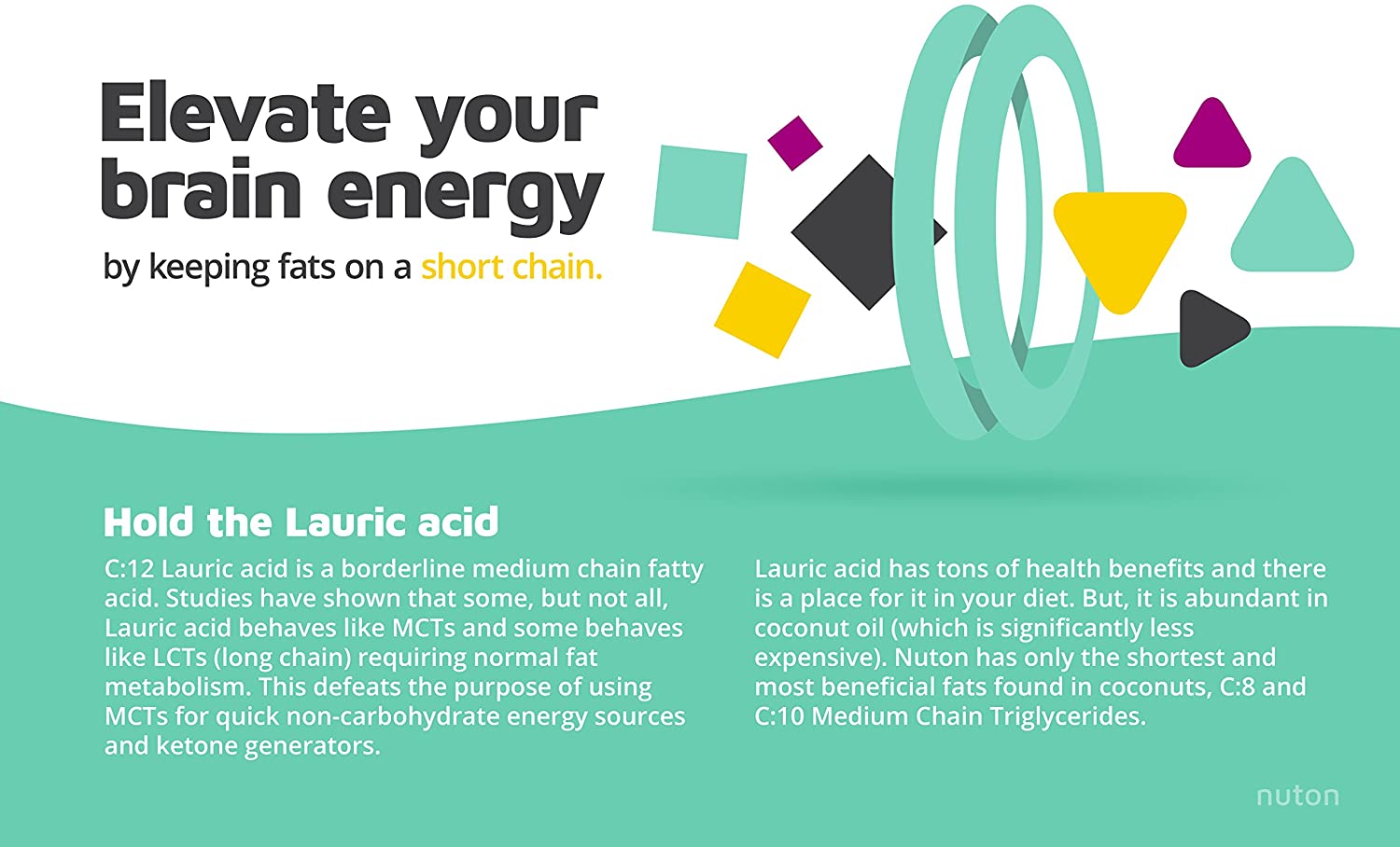
Lauric Acid has some great benefits, but there's tons of it in coconut oil. When you want the efficient MCTs, you want C10 and C8... and sometimes only C8.
When breaking down the fatty acids in the medium chain triglyceride group earlier in this article, we listed Caproic acid (C6), Caprylic acid (C8), Capric acid (C10), and Lauric acid (C12). However, we briefly disclaimed that C6 is intensely unpleasant, and C12 is arguable because it does not work as quickly as C8 and C10, requiring additional processing in the liver. While lauric acid C12 is technically an MCT, it's not the best one because of this. Meanwhile, C14 and up are LFAs, or Long-Chain Fatty Acids.
And unfortunately, if you look at the data, you'll see that coconut oil is composed of 47% C12 lauric acid, 16.5% C14 myristic acid, and 7.5% C16 palmitic acid.[58,59] This means that 71% of coconut oil is non-optimal if you want the best MCTs!
So what's wrong with C12?
The issue with lauric acid (C12): Additional steps in the liver
When looking at the metabolism speeds of fatty acids, the shorter chains work fastest, and the longer chains go slowest - with lauric acid (C12) somewhere in the middle, but up there with the longer chain fatty acids.[60]
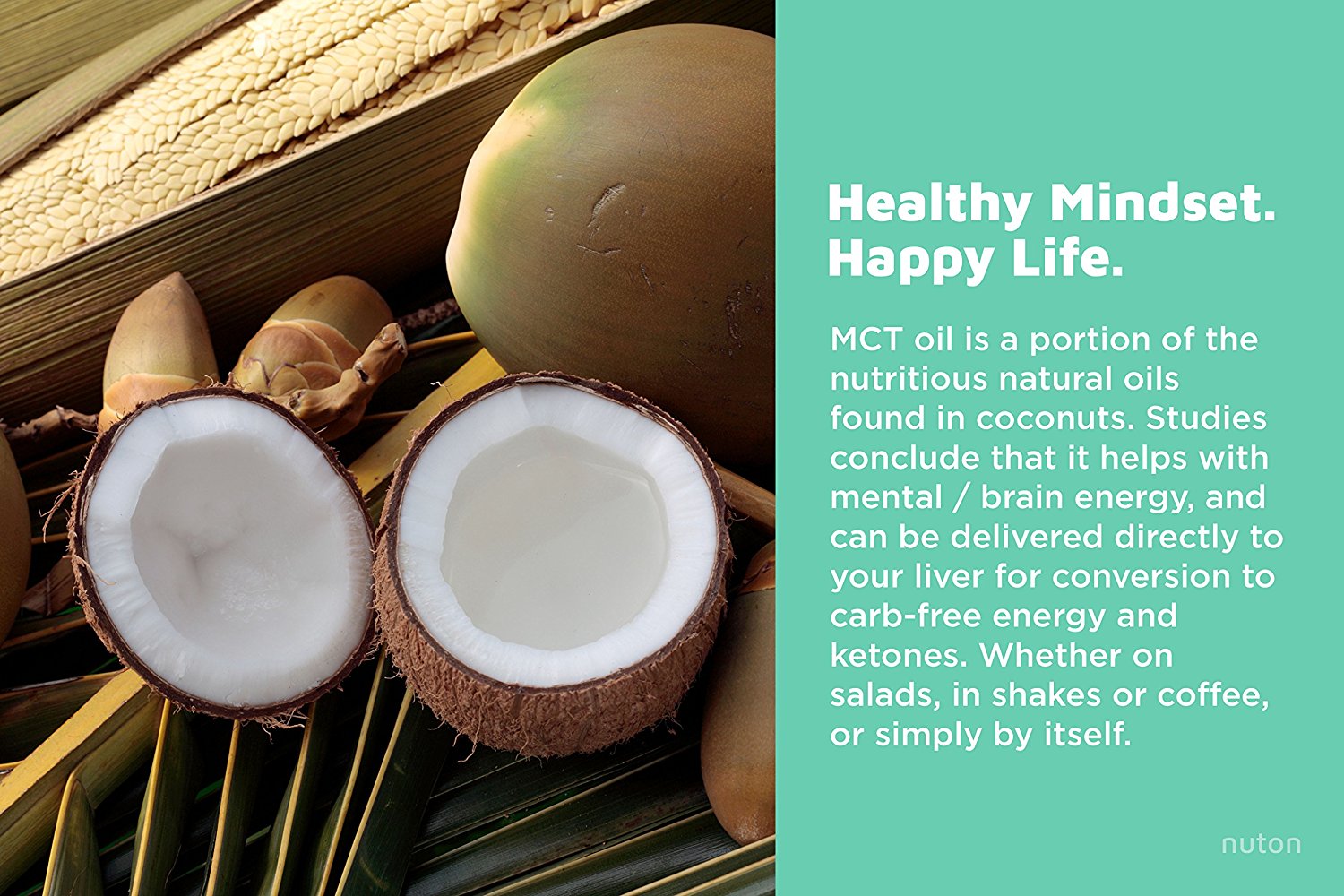
Is lauric acid really a "medium chain triglyceride"? Not 100% - and that's why it's not in Nuton (discontinued) or C8Vantage!
It is often said that lauric acid requires an additional "pit stop" in the liver, which is good enough for the layperson, but the research more specifically states that "[lauric acid] has a higher propensity to be absorbed via the lymphatics (presumably reflecting its greater capacity for incorporation into triglycerides), and so its access to the liver is delayed,"[61] citing two further studies to boost this argument.[62,63]
While that may not seem too bad -- C12 still eventually yields some ketones and has great therapeutic benefits... there's a bigger problem looming, and it may be the C12 causing these issues: gastrointestinal distress! And unfortunately, standard MCT oil has way too much of it.
Standard MCT oil: too much lauric acid... and too much diarrhea!
Just like coconut oil has too many long chains, regular MCT oil may as well. Some research shows that lauric acid (C12) may constitute about 30% of standard MCT oils on the market.[61] This isn't bad, but it's not optimal.
Is lauric acid the gut buster in MCT studies?
But it gets worse - far worse. High doses of MCT (such as 50g per day) yielded to a 100% diarrhea incidence in one study![64] It is also a commonly observed side effect in other studies.[65]
However, anecdotally, when removing the C12 from MCT, the diarrhea side effect seems to go away!
This information helps us hone in on our ideal MCT supplement - especially when you see the uniquely specific benefits of C8:
C8 Caprylic Acid: Four times better at producing ketones!
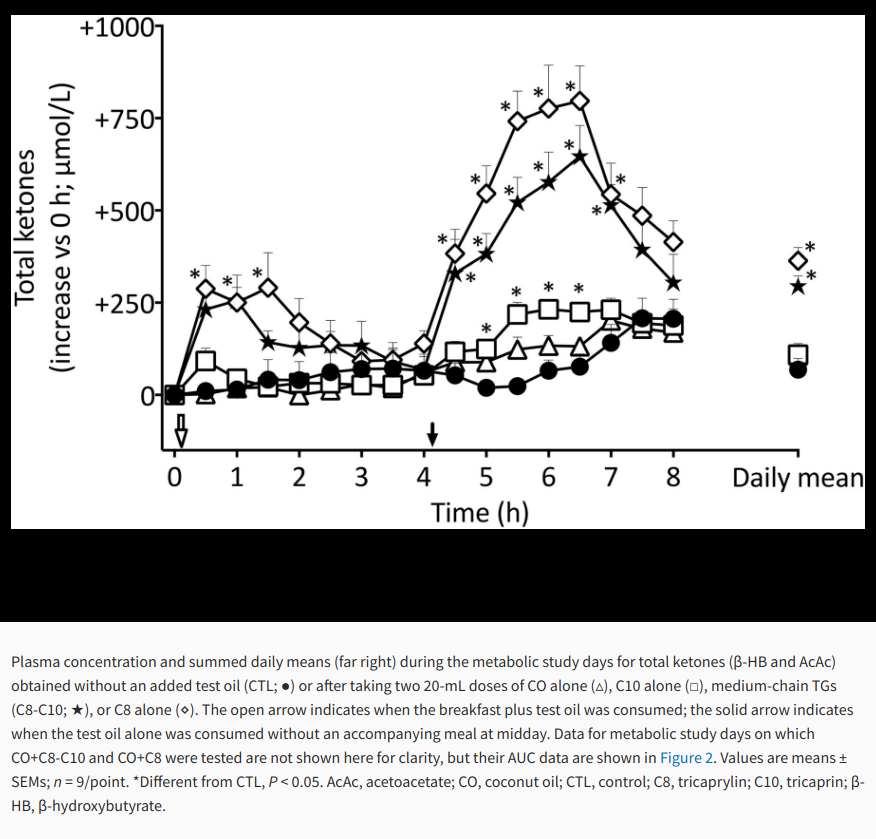
C8 MCT Oil does some amazing things compared to the other fatty acid chains over the next few hours![28]
As opposed to C12, C8 caprylic acid, also known as tricaprylin, is both fast and effective: A research study showed that MCT C8 (yielded 300% (4x) more ketones than coconut oil and 21% more ketones than "standard" MCT oil![28] In addition, it gave the best ketogenic effect in the 4-8 hour window,[28] yielding longer-lasting effects. This is extremely interesting because its effects are both faster and longer-lasting!
C8 Beats C10 in Fat Oxidation
Another research study published in 2017 found that C8 gave a 4x rate of beta-oxidation over C10![57] The researchers explained the difference by stating C10 depends more on CPT1 (carnitine palmitoyltransferase I) activity. So just like C12 has additional processing and absorption in the liver, there are a few dependencies that C10 has more so than C8.
This leads us to recognize that C8 is the superior MCT, but C10 is not far behind. Which you get ultimately depends on availability and budget.
MCT oil vs. powder: depends on the application
The popularity of MCT oil has created quite the market for it within the supplement industry. You could always get your hands on liquid MCT, but there are now powders and several types of supplements that utilize MCTs inside as well!
-
MCT oil: Check Amazon
-
MCT powder: More convenient but beware of the "binders" - Go with NNB C8Vantage
Because of their versatility and ease-of-use, we're huge fans of powdered MCT oil, which can be easily tossed into some coffee, protein powder, or any other food or drink when needed!
If looking for a convenient option, MCT powders are where it's at.
The benefits of MCT, especially with respect to C8Vantage. Image courtesy NNBNutrition.com
But there's an issue with many of the powders on the market though: they use high-glycemic carbs as binders! You see, in order to take liquid MCT to powder form, it needs to be sprayed against a dry surface and bound to a dry agent. And that agent is far too often maltodextrin, which is an extremely high-glycemic carbohydrate that might as well be labeled as "sugar".
If your MCT powder doesn't state exactly what it's bound to... then there's a great chance it's bound to a carbohydrate like maltodextrin -- the exact opposite of what MCT users want!
The solution? A trusted supplier. One like NNB Nutrition:
C8Vantage from NNB Nutrition solves the MCT powder puzzle
One of the top MCT powders available is C8Vantage from NNB Nutrition, which brings forth a high-quality, optimized formula to help deliver everything we've talked about above!
C8Vantage gets its name from its source - nearly 100% caprylic acid, or C8. NNB takes all-natural palm oil and isolates this MCT from everything else, removing any LCTs that may accompany it in its base form. What's left is nearly pure C8 (over 95%!), which we believe is the main driving force behind the powers of MCTs, as shown in the research cited above.[28,57]
Plated on plant-based tapioca fiber and pea protein, with other options available
In order to create C8Vantage powder, NNB Nutrition plates the MCT on plant-based fiber (tapioca fiber) and pea protein, giving an end product with negligible blood glucose or insulin effect! This also makes it dairy-free, vegan-friendly, GMO-free, and sustainably-sourced.
Ben showed the blood sugar effects (or lack thereof!) on our YouTube channel too:
In addition, NNB Nutrition has options available, such as a coconut oil based one (rather than palm fruit), but that comes at a slightly higher price. Milk protein options are also available, which make it creamier for use in applications such as MCT coffee creamers for consumers that are fine with dairy.
Taken from NNBNutrition.com, C8Vantage hosts several benefits over other MCT powders
When it comes to providing the improved energy, cognition, and performance that MCT oil is capable of, C8Vantage may just be one of the best powdered options available.
Don't sleep on NNB Nutrition
NNB Nutrition has been at the forefront of our feed for some time now, as they've been putting out a continuous stream of cutting-edge, high quality, lab-tested ingredients. We recently covered C8Vantage specifically as well, so if you want to read more about this product (and get the science specific to it), make sure you check out the article on it!
Watch our videos on MCT Oil
Mike from PricePlow and Shawn Wells of NNB Nutrition got together on IG Live to talk about MCT Oil, and then did a great round of Q&A:
Mike's older MCT / Ketone video
You can also see Mike's original video, exploring MCTs and their role with keto:
Stacking opportunities
On its own, MCT oil has a ton to offer. But use it in synchronization with other like-minded supplements, and you can build an effective stack that complements itself wonderfully. The easiest way to take MCT is alongside a quality protein powder (you'll still need water) or in a homemade salad dressing.
But in terms of your entire supplement stack, here's what we'd suggest as the top stacking options:
-
Glucose Disposal: Your Secret Weapon with GlucoVantage Dihydroberberine
There's no better GDA ingredient than berberine, and there's no better form of berberine than dihydroberberine in GlucoVantage!
To amplify the metabolic functioning benefits of MCT oil, you can benefit from using any glucose disposal agent (GDA) in tandem with MCTs. GDAs are best for optimizing blood glucose levels with meals, helping to shuttle nutrients to muscles where they're needed and keeping them from being stored as body fat.
When it comes to GDAs, nothing beats a high-quality berberine. NNB Nutrition offers one of the most innovative and powerful berberine ingredients in GlucoVantage. This ingredient actually uses dihydroberberine, a compound that is the next big thing in the GDA market!
-
The enhanced fat-loss stack
If MCT oil is a part of your regimen for its potential fat-oxidation and energy expenditure properties, using it in conjunction with popular fat-loss ingredients such as caffeine, L-carnitine, yohimbine, ashwagandha, synephrine, and grains of paradise could be great options too. These ingredients are all among our favorites here at PricePlow, and any combination of these, used responsibly, can make for an excellent fat-burning stack!
L-Carnitine, for instance, is used as a fatty acid transporter, which will be necessary to get the fats to your mitochondria! Yet too many people are deficient, as people are eating less meat that is high in L-carnitine.
Grains of paradise is a spice that helps convert white adipose tissue to the more thermogenic brown adipose tissue. NNB Nutrition makes CaloriBurn️, a highly-trusted form of this ingredient.
BAIBA may add to the "exercise effect"
NNB Nutrition has finally brought us a trusted and tested form of L-BAIBA, which we call an "exercise signal" that kickstarts incredible metabolic processes!
If that's not enough fat burning for you, allow us to introduce MitoBurn️, yet another innovative NNB Nutrition product. This next-level fat burner uses L-BAIBA to level up metabolic efficiency and can really help get your weight loss efforts in tow, making it a great partner for MCT oil.
-
Satiety / Appetite Suppression: Look into stearic acid
In terms of the satiety effects, we've become big fans of other forms of saturated fat as well. Consider stearic acid, which is found in animal fat as well as cocoa butter. Many are realizing that the MCT / stearic acid combination is an absolute appetite-killer.
The authorities told us to stop eating saturated fat, and then everything went off the rails - including our hunger! Bring things back to normal by giving your body the "essential" saturated fats it needs, from both ends of the spectrum. Perhaps all of this hunger is due to our bodies requesting these saturated fats, which includes MCT!
Yohimbine and caffeine, both mentioned above, may also help with appetite. Another ingredient to consider is saffron.
-
Supplements for cognitive focus
In terms of focus and cognition, there are tons of nootropic supplements out there. For beginners, our favorite three with incredible safety profiles are choline (specifically alpha-GPC or citicoline), acetyl L-carnitine (ALCAR), and L-tyrosine.
We argue that anything that stabilizes blood sugar levels will also help with long-term cognition, so GlucoVantage dihydroberberine discussed above may also be useful.
-
Supplements for Deeper Ketosis
Looking to really hone in on the ketogenic aspects of MCT oil, one can benefit by adding other ketogenic supplements into their arsenal. Supplements that help promote ketone production, such as BHB salts, make for an excellent pairing with MCT oil. Our recommendation there? Check out NNB's KetoVantage, a high-quality BHB salt formula!
MCT oil can be a regular part of any regimen, even if you're simply looking to clear up a bit of brain fog. However, most stacking opportunities that are highly advantageous are related to either weight loss or the ketogenic diet, perhaps even both!
Conclusion: Saturated Fat is Healthy. And MCT is very healthy!

When looking for quality MCT Powder, C8 (Caprylic Acid) is the way to go, and C8Vantage from NNB Nutrition is where to get it. Read more here and on NNBNutrition.com
It's easy to get upset at the decades of disinformation provided by the "authorities" regarding saturated fat. It does not cause heart disease, and when we replaced it with all kinds of "frankenfats" from omega-6 polyunsaturated fatty acids (n-6 PUFA), literally everything went wrong.
But the time for dietary regret is over. Now is the time for the solution, and the solution is bringing saturated fats back and dumping those disgusting "vegetable" oils (read: "seed oils"). Using MCT is a major piece to this puzzle.
Showing the potential of providing efficient energy, increasing energy expenditure, correcting metabolic imbalances, and improving cognition, MCT is an incredibly well-rounded ingredient. It comes with caloric value as a dietary fat, sure, but is what we consider an essential fat you should have in your diet anyways! Especially when driven closer to C8, it's superior to so many other fats, not only in absorption but also in its effects mentioned above.
While fitness goals may vary - powerlifting, bodybuilding, cross-training, fat-loss, cognition, etc - MCT fits in the picture - regardless of diet.
It's time to bring back saturated fats. And it starts with MCT, mainly from C8.

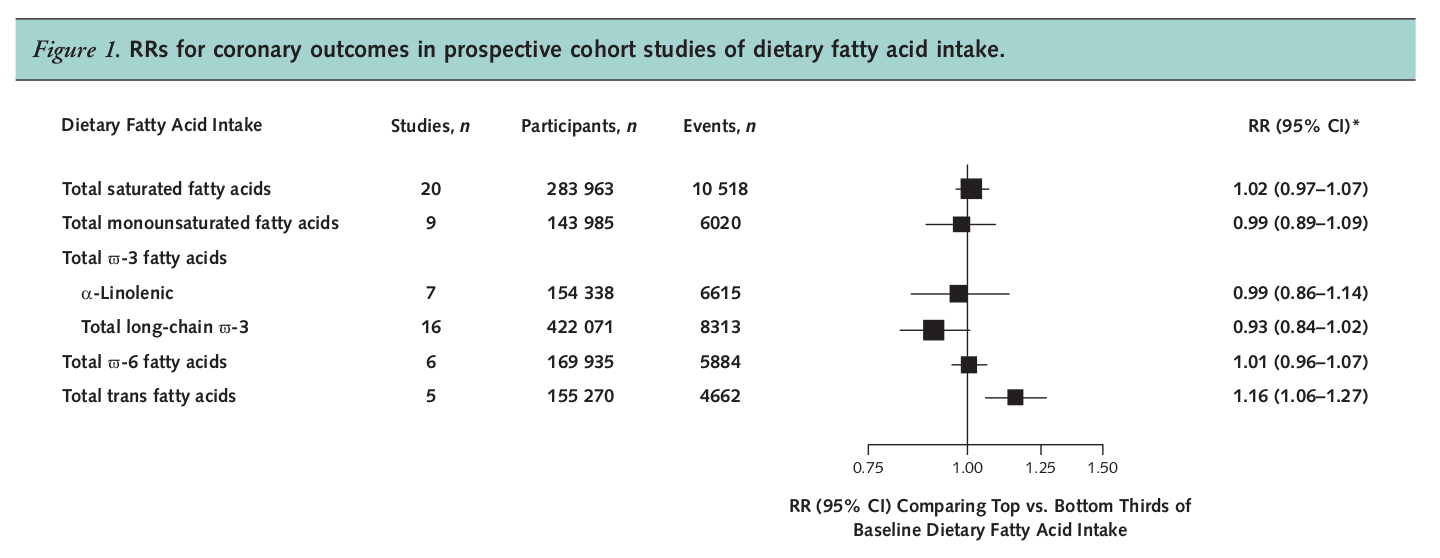
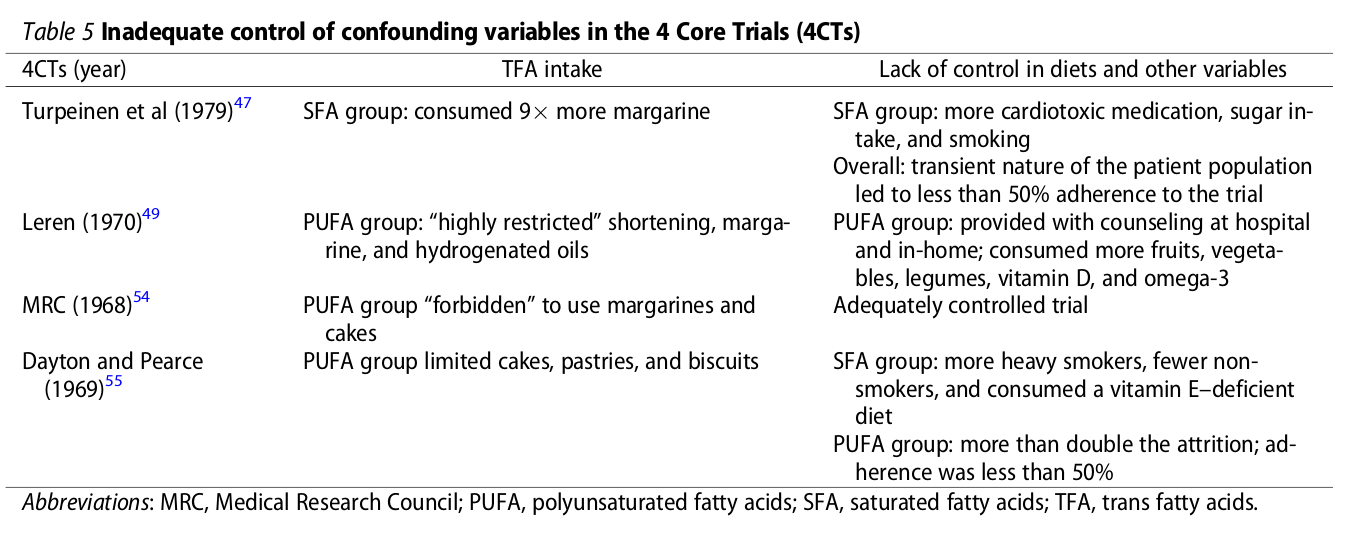
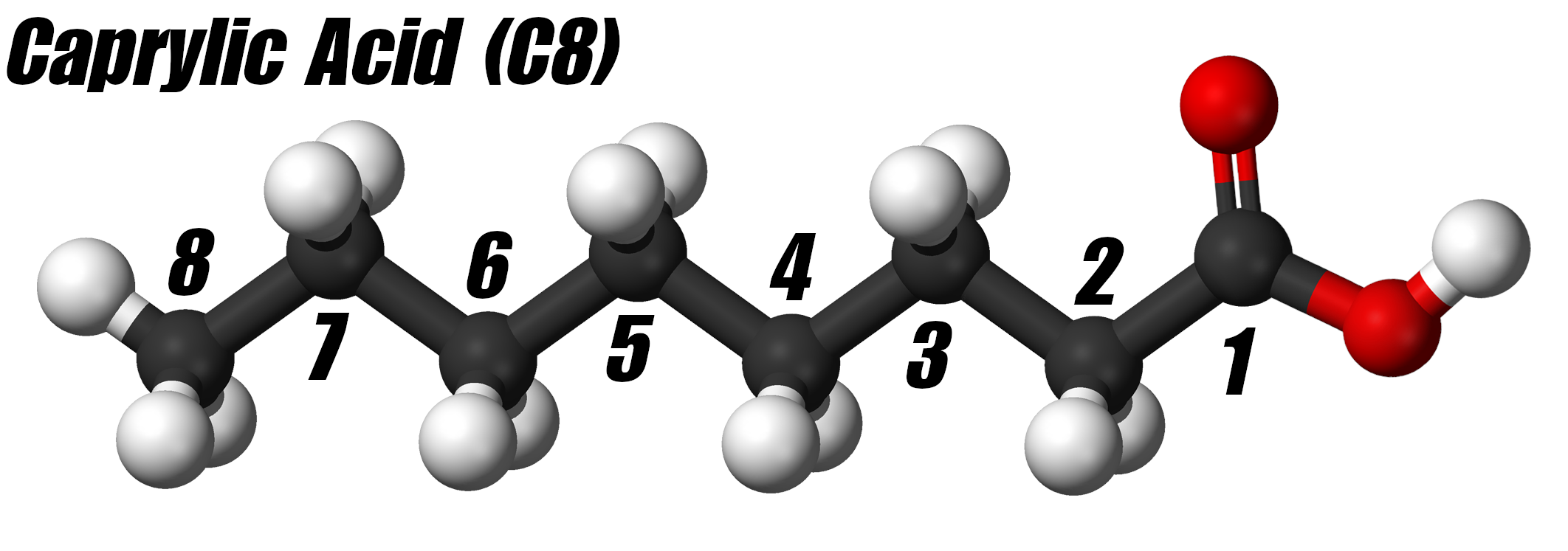

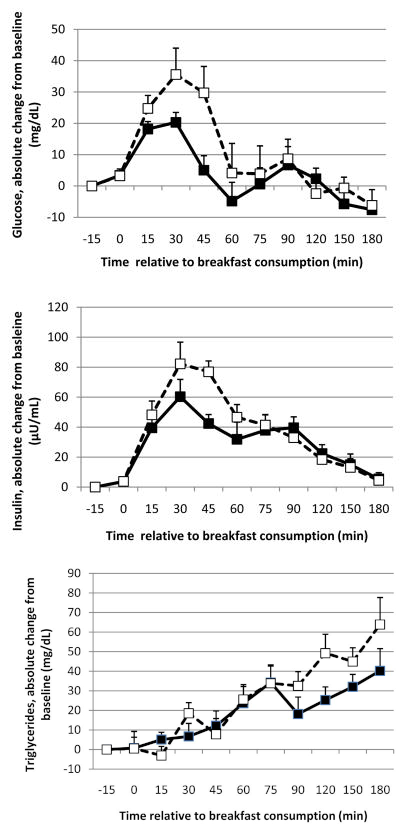
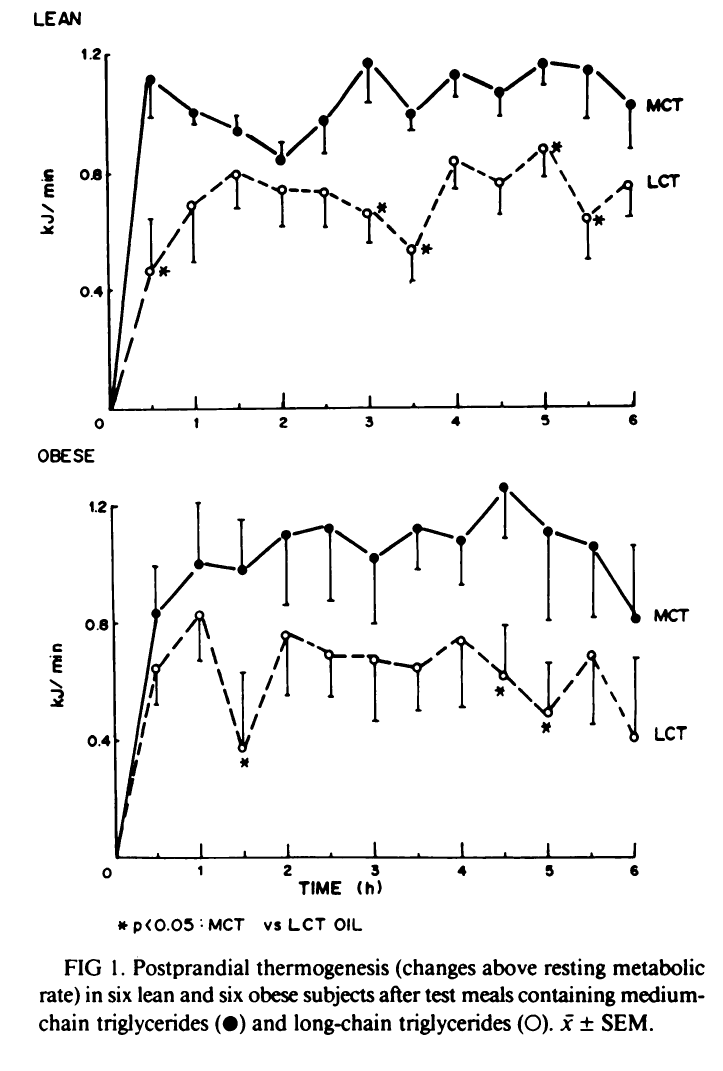
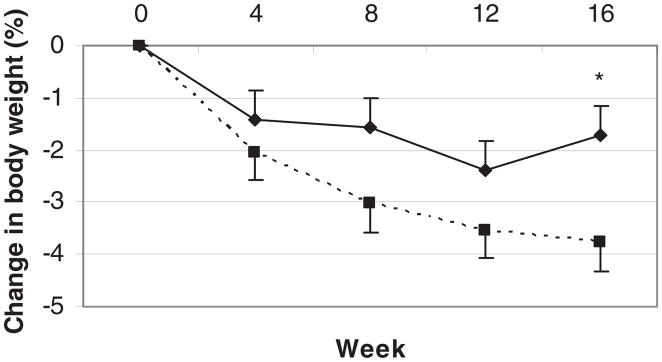
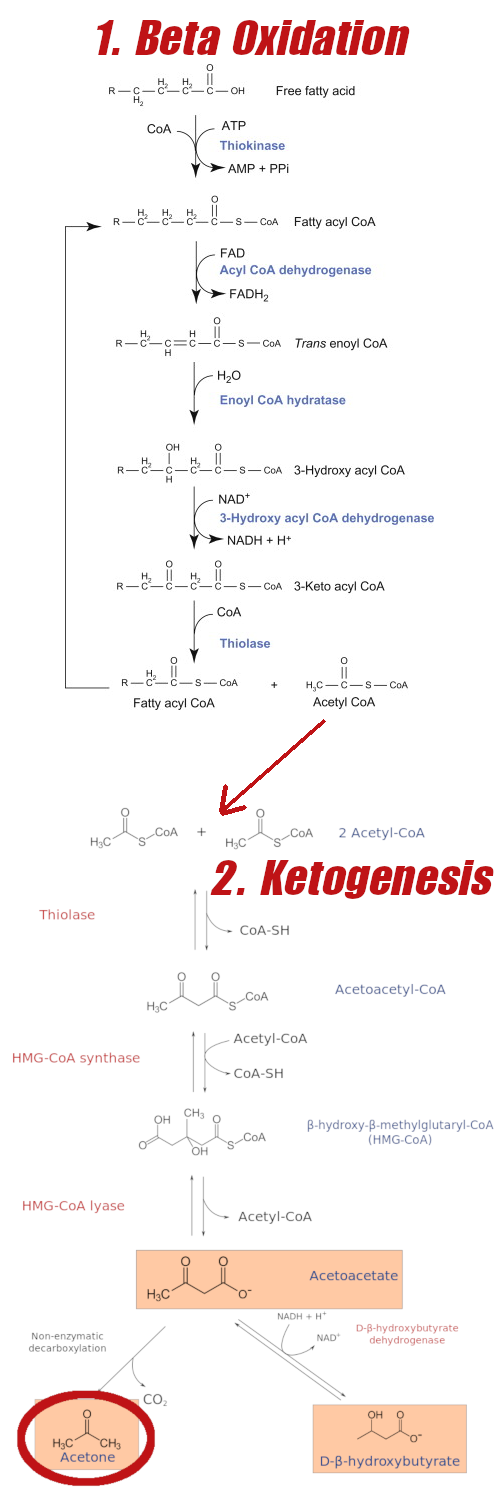
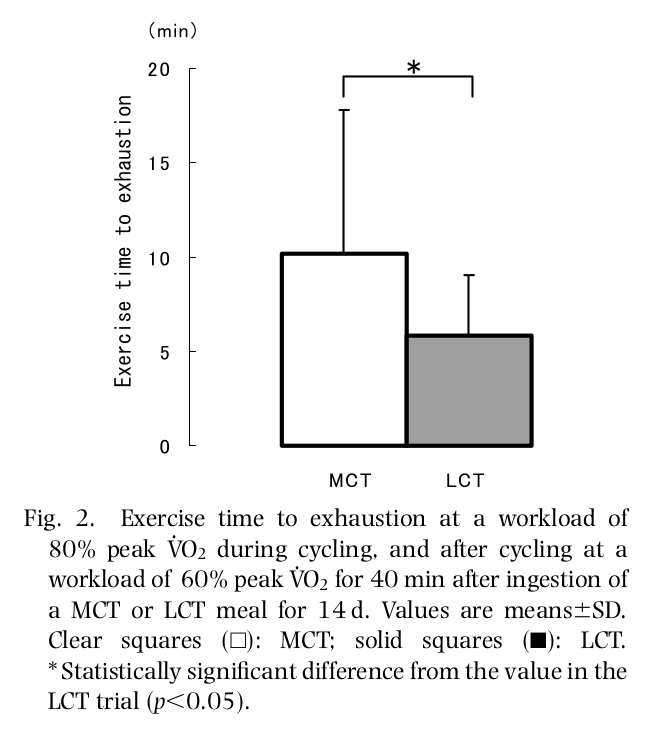
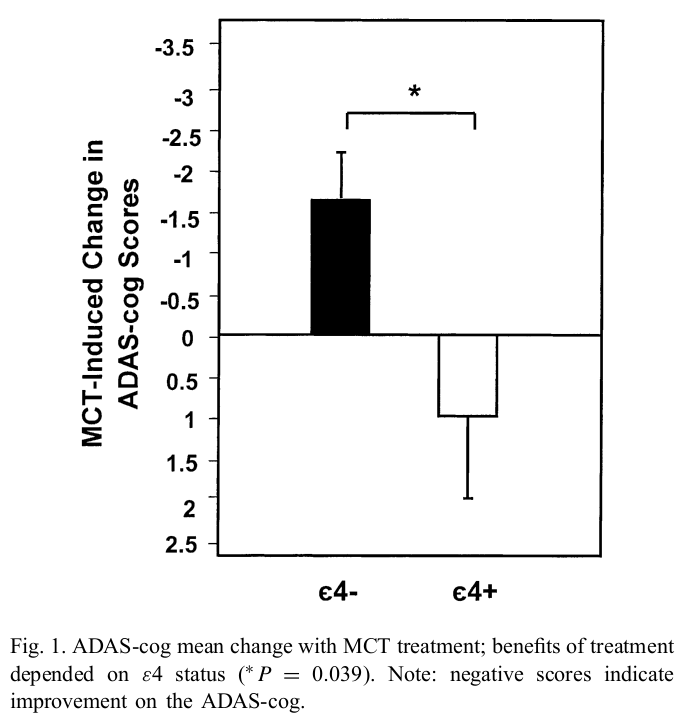


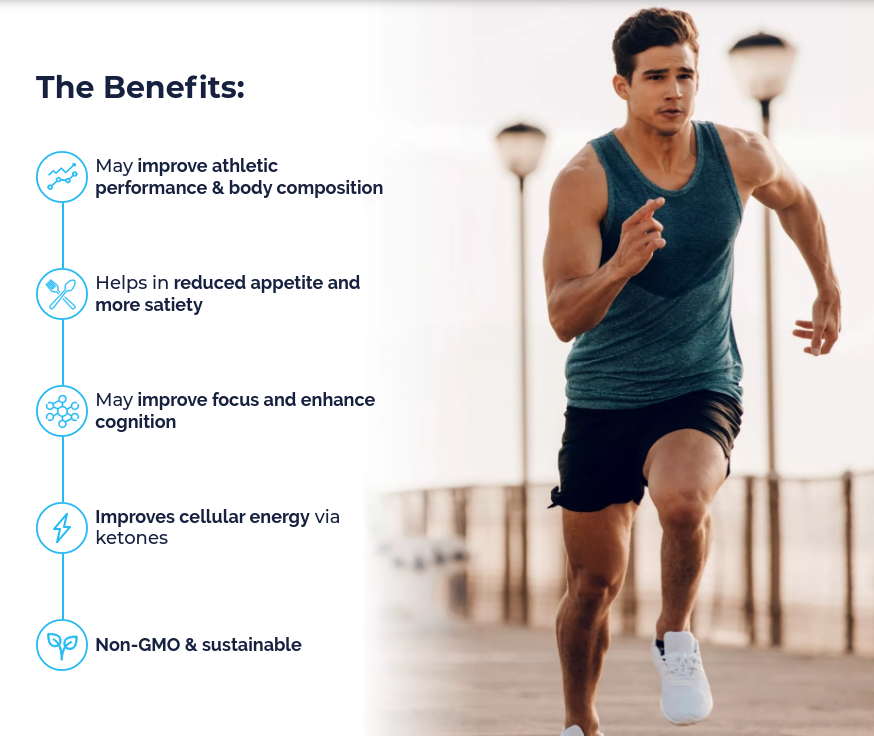
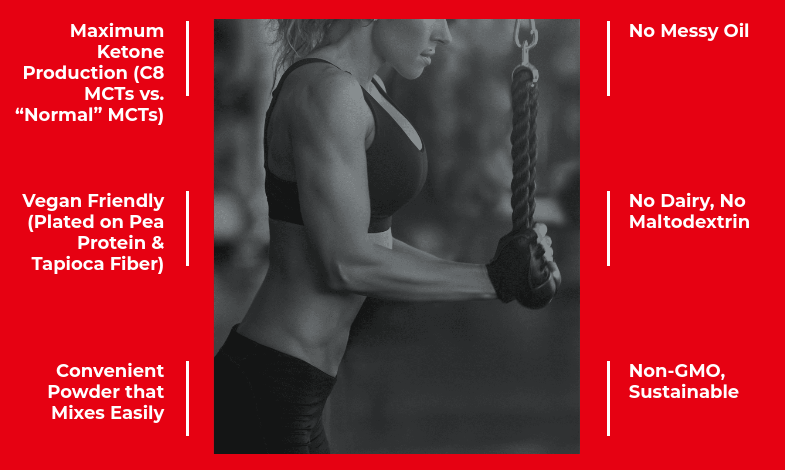

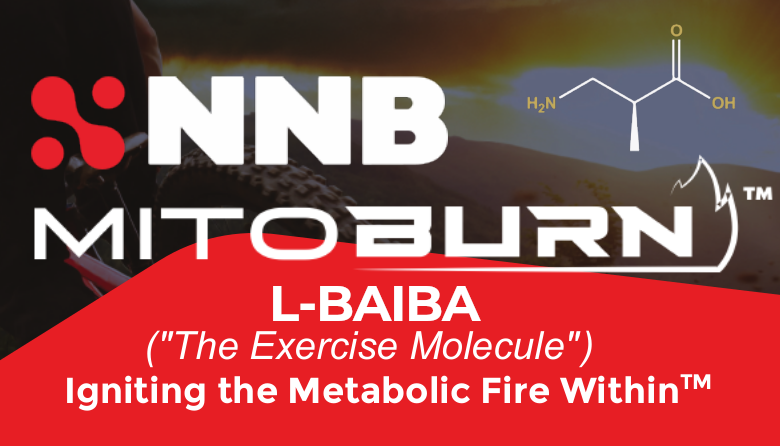


Comments and Discussion (Powered by the PricePlow Forum)